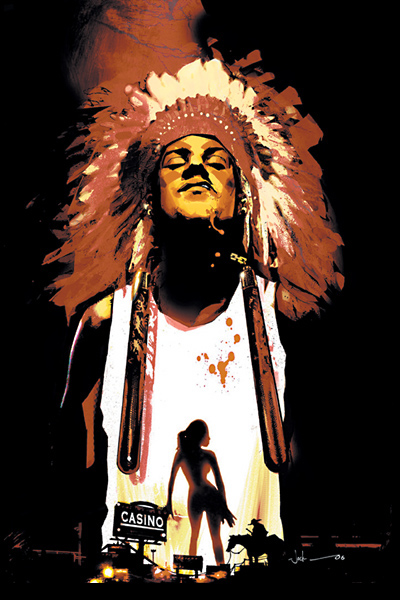So I can't feel or imagine how bad the alcohol problem is. But I know the statistics, so I wasn't surprised by Mile Post 398's depiction of drunken Indians. I'd say it matched my vague expectations based on what I've seen and read.
This is good. It says the movie's portrayal of rez life is honest and authentic. It isn't too positive or negative, it's simply real.
Compare this to the portrayal of rez life in the SCALPED comic book, which (as you may know) I've ragged on frequently. In SCALPED, almost everyone is a drunk, gang member, prostitute, or corrupt official. With 90% of the people portrayed as criminals, thugs, and lowlifes, there are few if any rays of sunshine.
Balancing the picture
In Mile Post 398, a whole crowd of Navajos, including two main characters, are constantly drunk. That's the downside of rez life. But these Navajos aren't spouse abusers, meth addicts, or hard-core crooks. Other than driving drunk and buying bootleg liquor, they don't break the law or hurt anybody. (Not to excuse drunk driving, but it's slightly less dangerous when there are only 10 or so people per square mile.)
As you might expect in a good work of art, the film also shows the positive side. There are strong Navajo women trying to hold their families together. There are Navajos who own and manage restaurants and stores, or maintain order with efficient police work. There's Ray, a quiet pillar of the community who has worked the same job for 30 years and raised three daughters to adulthood.
The ratio of good to bad in Mile Post 398 is something like 60/40. Being troubled half the time may seem grim to people like me, who have lived a charmed life, but it's not hopeless. It's the kind of situation you might find in any impoverished small town, where times are tough but people still care.
In SCALPED, the good/bad ratio is more like 10/90. This is relentlessly, unalterably bad. It's far worse than the rez life depicted in Mile Post 398 or in any real or fictional reservation I've seen. Hence my dismissal of SCALPED's stereotypical vision.


No comments:
Post a Comment